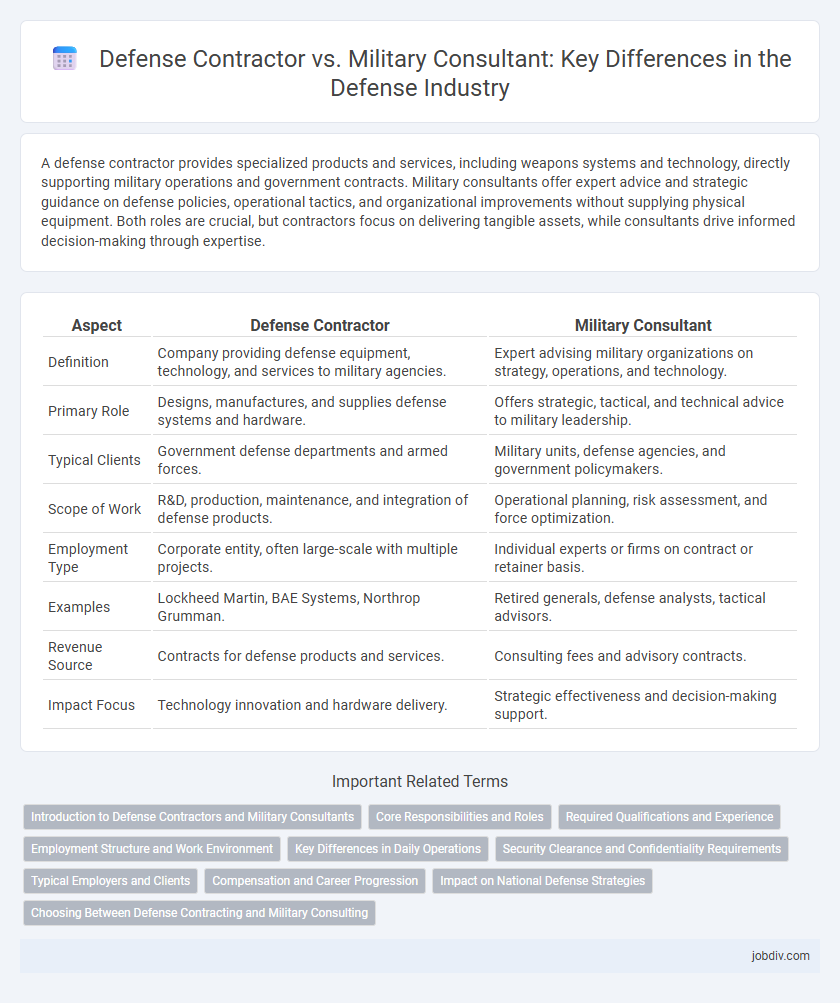A defense contractor provides specialized products and services, including weapons systems and technology, directly supporting military operations and government contracts. Military consultants offer expert advice and strategic guidance on defense policies, operational tactics, and organizational improvements without supplying physical equipment. Both roles are crucial, but contractors focus on delivering tangible assets, while consultants drive informed decision-making through expertise.
Table of Comparison
| Aspect | Defense Contractor | Military Consultant |
|---|---|---|
| Definition | Company providing defense equipment, technology, and services to military agencies. | Expert advising military organizations on strategy, operations, and technology. |
| Primary Role | Designs, manufactures, and supplies defense systems and hardware. | Offers strategic, tactical, and technical advice to military leadership. |
| Typical Clients | Government defense departments and armed forces. | Military units, defense agencies, and government policymakers. |
| Scope of Work | R&D, production, maintenance, and integration of defense products. | Operational planning, risk assessment, and force optimization. |
| Employment Type | Corporate entity, often large-scale with multiple projects. | Individual experts or firms on contract or retainer basis. |
| Examples | Lockheed Martin, BAE Systems, Northrop Grumman. | Retired generals, defense analysts, tactical advisors. |
| Revenue Source | Contracts for defense products and services. | Consulting fees and advisory contracts. |
| Impact Focus | Technology innovation and hardware delivery. | Strategic effectiveness and decision-making support. |
Introduction to Defense Contractors and Military Consultants
Defense contractors provide specialized products and services, including weapons systems, technology development, and logistical support, primarily supplying government military agencies. Military consultants leverage expertise gained through military service or defense industry experience to advise on strategy, operational efficiency, and security protocols. Both roles play critical parts in national defense ecosystems, contributing to enhanced operational capabilities and informed decision-making.
Core Responsibilities and Roles
Defense contractors are primarily responsible for designing, manufacturing, and supplying advanced weapons systems, military technology, and equipment to armed forces, ensuring operational readiness and technological superiority. Military consultants provide expert advice on strategy, operational planning, risk assessment, and defense policy to enhance decision-making for military and government agencies. While contractors focus on tangible product development and logistics, consultants specialize in offering strategic insights and improving military effectiveness through advisory roles.
Required Qualifications and Experience
Defense contractors must have specialized engineering certifications, extensive experience in manufacturing military-grade equipment, and compliance with government security clearances. Military consultants typically require prior active-duty experience, advanced strategic training, and deep knowledge of defense operations and policies. Both roles demand a comprehensive understanding of defense regulations and strong analytical skills to support national security missions effectively.
Employment Structure and Work Environment
Defense contractors typically operate as large organizations or corporations employing a diverse workforce under formal contracts with government agencies, providing scalable services and products within structured work environments. Military consultants often work as independent specialists or small firms offering expert advice on defense strategies, technology, and policy, enjoying more flexible, project-based roles with frequent travel to client sites. Employment in defense contracting emphasizes long-term stability and integration within established corporate frameworks, while military consulting prioritizes adaptability, specialized knowledge, and direct interaction with military leadership.
Key Differences in Daily Operations
Defense contractors manage large-scale projects including procurement, manufacturing, and system integration for military applications, often coordinating with multiple government agencies and suppliers. Military consultants provide specialized expertise and strategic advice directly to armed forces or defense organizations, focusing on training, tactical planning, and operational assessments. Daily operations of contractors emphasize logistical execution and compliance with defense regulations, while consultants focus on mission-specific problem solving and real-time decision support.
Security Clearance and Confidentiality Requirements
Defense contractors typically require high-level security clearances such as Secret or Top Secret to access classified government projects, ensuring strict adherence to federal confidentiality regulations. Military consultants often hold similar clearances but may have more specialized access based on their advisory roles, involving sensitive operational or strategic information. Both roles demand rigorous background checks and continuous compliance with security protocols to maintain national security and protect classified data.
Typical Employers and Clients
Defense contractors primarily work with government defense departments, military branches, and large defense agencies, providing advanced technology, equipment, and systems integration. Military consultants often serve a broader range of clients, including private security firms, international organizations, and defense-related think tanks, offering strategic advice and specialized expertise. Both operate within the defense ecosystem but differ in their client base and typical employment environments.
Compensation and Career Progression
Defense contractors typically receive higher base salaries and performance-based bonuses due to large government contracts, while military consultants often earn fees based on project scope or hourly rates, offering more flexible but variable income. Career progression for defense contractors includes structured advancement within corporate hierarchies and potential specialization in technology or logistics, whereas military consultants leverage prior service experience to build reputations, often transitioning into advisory roles or defense policy positions. Understanding compensation trends and career pathways helps optimize professional growth and financial outcomes in defense sector roles.
Impact on National Defense Strategies
Defense contractors provide essential hardware, software, and logistical support that directly shape the operational capabilities of armed forces, significantly influencing national defense strategies through innovation and resource availability. Military consultants offer strategic expertise, tactical advice, and policy analysis that refine decision-making processes and enhance the effectiveness of defense planning at governmental and military leadership levels. Both roles are critical, with contractors driving technological advancement and consultants optimizing strategic implementation to maintain a robust and adaptive national defense posture.
Choosing Between Defense Contracting and Military Consulting
Defense contracting involves large-scale procurement, manufacturing, and supply of military equipment and technology, requiring extensive project management and compliance with government regulations. Military consulting centers on providing expert strategic advice, training, and operational support based on specialized knowledge and experience within defense sectors. Choosing between defense contracting and military consulting depends on whether one prefers managing complex defense projects or offering high-level tactical expertise to military clients.
Defense Contractor vs Military Consultant Infographic

 jobdiv.com
jobdiv.com